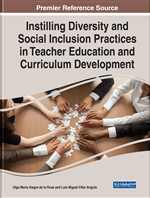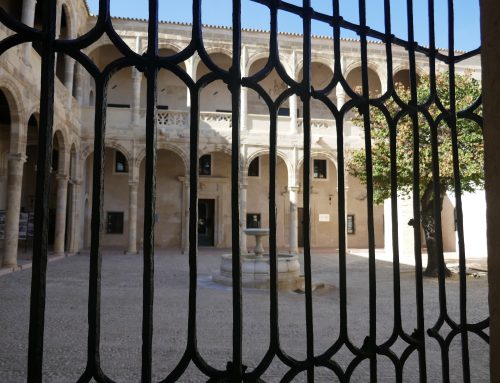
ISBN13: 9781668448120|
ISBN10: 1668448122|E
ISBN13: 9781668448137|
ISBN13 Softcover: 9781668448168

https://www.igi-global.com/book/_/292441
Description:
There has recently been a societal push to better achieve equity for all, with many bringing to light the bias, racism, and discrimination that many factions face on a daily basis. Naturally, integrating diversity and social inclusion thoughts into the classroom is one of the best ways to start changing the mindset of society and promoting more inclusive practices in the next generations. Therefore, diversity and social inclusion have become common approaches in the planning and management of primary, secondary, and higher education schools in many international contexts. However, there are certainly challenges that must be overcome in developing these new practices and their implementation within teacher curriculum.
Instilling Diversity and Social Inclusion Practices in Teacher Education and Curriculum Development provides an analysis of educational inclusion practices and identifies university students’ voices on diversity and social inclusion. It further assesses teacher performance in an international online training context and promotes a model of curriculum development on diversity and social inclusion. Covering topics such as culturally competent teachers, student academic achievement, and attitudes towards diversity, this premier reference source is an excellent resource for teacher educators, pre-service teachers, administrators and educators of both K-12 and higher education, social workers, researchers, and academicians.
Coverage:
The many academic areas covered in this publication include, but are not limited to:
- Attitudes Towards Diversity
- Children’s Literature
- Culturally Competent Teachers
- Digital Materials
- Inclusive Leadership
- School Diversity
- Self-Contained Social Inclusive Classrooms
- Social Inclusion
- Student Academic Achievement
- Student Teachers
- Teacher Training
Chapter 1
The Reality of Self-Contained Social Inclusive Classrooms
Paula Hernández-Dionis
This study aims to analyze the reality of inclusive classrooms by studying music and dance schools (MDS) in the autonomous community of the Canary Islands. Teachers’ growing interest in offering an adequate response to diversity in today’s schools should be stimulated by providing training spaces and new methodological tools. The development of this training requires a significant revision to the curriculum. A review of applicable regulations was carried out to meet the study’s objective, analyzing the proposed dimensions and completing a bibliographic review in sources of scientific interest. A series of interviews included 12 teachers from eight MDS of the five Canary Islands with official MDS. The results revealed a disparate situation. It is a challenge to develop an inclusive teaching-learning process in all its facets. Therefore, it is necessary to outline an important change in the current system, including a series of proposals to be developed in the future.
Chapter 2
The Making of Diverse Schools
Natalia Martinez
This chapter presents the results of research carried out over three years applying the Pedagogical Theatre as a teaching strategy for the development of competence in a group of 22 people with Down syndrome in Tenerife. From the theoretical point of view it has been possible to verify that the proposed model of theatrical pedagogy supposes a contribution in the competency improvement of people with Down syndrome. From the methodological perspective of mixed studies, the relevance of this methodology as a resource for attention to diversity has been verified. Finally, the results have demonstrated the benefits of the intervention in the competence development of the population under study.
Chapter 3
Strategies for Presuming Competence in the Inclusive School
Antonio Guijarro Expósito
Inclusive education in the school context is a permanent challenge for teaching staff in educational centres. An essential aspect within this inclusive process is to guarantee the adequate training of teaching staff and to attend to all the educational demands and needs of the child and adolescent population with a disability in an individualized manner. The process of adaptation and psychosocial adjustment to a disease considered chronic, or in much more complex situations, as occurs with so-called rare diseases, is a daily challenge for the affected people and their families. One of the most relevant issues within this adaptation process is the role of academic education, as an element that favours or facilitates inclusive processes. Based on a model that aims to offer a global vision of the psychosocial adaptation process, where various factors and variables from different dimensions are integrated and where healthcare, educational and social professionals all intervene.
Chapter 4
Children’s Literature for Inclusive Education
Carmen Perdomo-López
The aim of this study is to find out the degree of training that future teachers have in dealing with diversity in the classroom using children’s literature as a teaching resource. To this end, a comparative study has been carried out between two Specialisms taught Degree in Early Childhood Education in the Faculty of Education of the University of La Laguna (Tenerife): Specialism in Motivation to Reading and Specialism in Attention to Diversity . Semi-structured questionnaires have been used to carry out the comparative study of the answers of the students of both Specialisms to key dimensions, such as the knowledge, they have diversity in the classroom, as well as the use of children’s literature as a resource to achieve a change in attitudes and educational progress of all the students. Finally, it has been concluded that the students do not have the knowledge, nor do they have the resources to take advantage, in their future professional experience, on the possibilities offered by children’s literature as a cultural instrument for transmitting values and approaching reality.
Chapter 5
Development of Digital Materials for Diversity and Social Inclusion Practices
Julio Cabero, Carmen Llorente
When addressing educational and social inclusion, it is fundamental to take into account several aspects, such as the fact that not only people with some difficulty benefit from them, the right of everyone to education, and the incorporation of those individuals excluded from the system based on gender, culture, race or personal characteristics. Thus, the development of digital materials from and for the practice of diversity and social inclusion is an integrating element that, from formats such as Augmented, Mixed or Virtual Reality, provides different possibilities in those areas where they are least integrated. This chapter addresses, firstly, the concepts of social inclusion and diversity, the influence and impact of Information and Communication Technologies (ICTs), and the digital materials used in the educational scope from different analytical approaches.
Chapter 6
Review of Research of Future Teachers’ Attitudes Towards Diversity and Social Inclusion
María Pascual, Susana Sánchez, María Sevillano
The aim of this chapter is to present the results of a review of specialist publications that address the attitudes of future teachers towards attention to diversity and social inclusion. The bibliometric search enabled us to analyze student teachers’ interest in, and attitudes towards, inclusion as a way to improve the inclusion process. A descriptive study was carried out to explore and organize the scientific production in educational research on trainee teachers’ attitudes to inclusion, and to know the covariance that has occurred in the last 10 years. The data were extracted from the Web of Science (WoS), Scopus and Dialnet databases. The formula used in the bibliometric search process was (title, abstract and key words): attitudes* OR beliefs* AND inclusive education AND Teaching students, which yielded 68 registers for analysis. The results show that future teachers’ attitudes towards inclusion were generally positive. The research suggests a relation between attitude towards inclusion and self-sufficiency, on the basis of prior training in inclusive educational proposals.
Chapter 7
Student Teachers’ Beliefs and Attitudes Towards Diversity and Social Inclusion
Carmen Nuria Arvelo-Rosales
The aim of this chapter is to analyse the competencies for inclusion developed by students of the Degree in Primary Education. After an analysis of the general competencies taught in the degree, the knowledge, skills and attitudes for inclusion of trainee teachers were analysed. To achieve these objectives, a non-experimental, cross-sectional and descriptive research design was carried out. A total of 440 students on the degree course in Primary Education at the University of La Laguna (Spain) took part in the study. The data were collected with a questionnaire developed ad hoc based on the inclusive competency profile developed by the EADSNE project (2012). The results showed that there was positive development of the competencies included in the profile. Therefore, the students had developed the knowledge, skills and attitudes necessary to deal with diversity and become inclusive teachers.
Chapter 8
Impact of Culturally Competent Teachers on Their Students’ Academic Achievement
José María Fernández Batanero, Marta Montenegro Rueda, José Fernández Cerero
One of the most important phenomena in the teaching and learning process is academic performance. It is known to be a variable that has given rise to various national and international research studies, in which the factors that can influence academic performance, such as the cultural competence of the teacher, are generally analysed to a greater or lesser extent. For this purpose, an introduction to the importance of cultural competence in the education system is given. We proceed to conceptualise the terms «Cultural competence of teachers» and «Academic performance» and then carry out a study through a systematic review of the main scientific databases in order to better understand the knowledge structure of this scientific domain. Among the conclusions we can highlight that the teaching staff is aware of the importance of diversity, however, they state that they feel little competence in this field. Likewise, the scarce presence of cultural competences in teacher training plans prevents teachers from responding effectively to the challenges posed by a culturally diverse classroom
Chapter 9
Enhancing Teacher Leadership for Collaborative Networks
Blanca Berral-Ortiz, Francisco Hinojo Lucena, Pilar Reche, José Martínez Domingo
Currently, among the new challenges of educational organizations in a technological society, there is a drive towards pedagogical or teacher-centered leadership, which brings together collaborative or networked work capable of responding to emerging challenges. Thus, the purpose of this chapter focuses on analyzing the role of this leadership from a theoretical approach, first, determining the main roles and competencies within pedagogical leadership, as well as the challenges of organizations in the current digital era. On the other hand, in a second moment, identifying collaborative networks delimiting their main characteristics and highlighting the importance of personal, emotional leadership to promote sustainable organizations, as one of the fundamental axes, delimited in the 2030 Agenda (United Nations, 2018). Finally, it concludes with contributions for teaching improvement and collaborative networks by determining the key points, such as the need to rethink the current management and leadership, as well as the need to enhance the collaborative networking of the centers.
Chapter 10
Leading Inclusive Schools: Participation, Collaboration, and Openness to the Community
Inmaculada Gómez-Hurtado, Inmaculada González-Falcón, María del Pilar García-Rodríguez, Jose Manuel Coronel-Llamas
The aim of the chapter we present here is to learn how the management team promotes openness to the community and collaboration to develop an inclusive culture. This study is framed within the R+D+I project “School management leadership and its contribution to improving inclusion in compulsory education” . In a mixed research approach, the project develops and implements a tool for the evaluation of inclusive education in schools through participatory methodologies. In this paper we discuss the different ways of understanding inclusive leadership and the main elements intertwined in it, focusing later on the participation of management teams as catalysts of the educational community for the development of inclusive practices in schools. To this end, from the teachers’ perspectives, we analysed the data gathered through the LEI-Q-Profesorado questionnaire.. The main outcomes and conclusions indicate that the teaching staff of the schools surveyed have a positive perception of the actions taken by the management teams in the exercise of their inclusive leadership.
Chapter 11
Sustainability in Pedagogy Degree Curricula: The Environmental, Inclusive, and Sociocultural Perspectives
Juan Rodríguez
Sustainable development means the care and protection of the natural environment and humanity. In educational contexts, sustainability should develop competencies in these two closely related areas of sustainability. This work investigates the presence of descriptors linked to sustainability in the curricula of Spanish State Pedagogy degrees. The results showed the scant presence in these degrees of subjects whose designation reflected a direct link with sustainability. Moreover, the teaching projects of the subjects showed a predominance of professional competencies not explicitly linked to sustainability, while the presence of competencies directly related to sustainability, sociocultural perspectives, environmental and economic perspectives was scarcer. In the content descriptors, the most frequently used terms were related to the environmental dimension as opposed to more inclusive, social and professionalising terms. University education, the competencies of the degrees should be explicitly linked to sustainability perspectives.
Chapter 12
Evaluation of Supports for Inclusive Education: A Study of People With Intellectual Disability and Autism Spectrum Disorders in Spain
Pedro Jimenez
This chapter describes inclusion processes and their evaluation in school contexts. Address the question of the assessment of people with intellectual and developmental disabilities, as well as the assessment of factors related to inclusion. As an example, data from a study carried out with schoolchildren with Autistic Spectrum Disorders (ASD) in Spain (n = 249) will be presented. The research carried out with schoolchildren between 5 and 17 years of age, the methodology used was the evaluation through a support needs assessment scale and analysis of the scores obtained on the scale. The results have indicated very intense support needs in most of the people with ASD evaluated and more intense in scale values in support areas related to inclusion, than other populations with intellectual disabilities, but without autism. The results suggest the importance of having reliability measures that allow to assess the intensity of the support needs of schoolchildren, with or without intellectual disabilities, and that help to promote support systems based on evidence of effectiveness.
Chapter 13
An Online Master of Diversity and Social Inclusion in Italy
Alessandro Caforio, Cristiana Sanalitro
Contextualizing the development of the Master program on diversity and inclusion at country level and specifically in Italy, this chapter has several objectives: • Providing an overview of regulations and approaches promoted in Italy for inclusion in education. • Defining the objective for a Master program in the country. • Introducing International Telematic University UNINETTUNO experiences in inclusive research and education activities targeting several vulnerable groups, ranging from migrants and refugees, to ageing people, to students with sensory disabilities. • Presenting the main references for technological challenges in accessibility. • Summarizing the specific dimensions to be addressed for the development of an international master program focusing on diversity and inclusion.
Chapter 14
Functions of Teacher Training Towards the Support of Students With Mental Health
Anna Jarkiewicz, Joanna Leek
The chapter aims to identify planned and attained educational functions and measures taken to address mental health issues in Poland. These will be studied from two perspectives: macro: policy of education in Poland (analysis of educational reports, law on education) and micro: the experiences of young people who have experienced a mental health crisis while in education.By using an interpretative paradigm (Wilson, 1973), first, we identified planned functions by analysing the international and national education policy towards mental health issues. Then, we identified to what extent these functions have been successfully attained by analysing 12 autobiographical narrative interviews with people aged between 19 and 25, who experienced mental health problems during their education.The research results will be presented in the form of the school tasks presented in official documents that best illustrate the steps being taken towards prevention in the field of mental health as well as providing support for students with mental health issues.
Chapter 15
Training and Mentoring Activities for Teachers Involved in the Inclusive Education Process in Romania
Daniel Mara
In this chapter, we will present the activities that we have designed and implemented in a project that had as its theme the continuous training of teachers for the development of psycho-pedagogical and specialized skills, necessary to build an inclusive school. The intervention on teachers was conceived as a mentoring program, which would provide a structured framework for opportunities to improve the teaching activity carried out with all students in the class. Today’s schools are educational institutions whose mission is to ensure a quality education for all students, by using all resources and partnerships with their communities.
Chapter 16
Attitudes of Teachers Towards Diversity and Social Inclusion in Italy, Poland, Romania, and Spain
Olga Alegre-de-la-Rosa, Luis Villar-Angulo
The present study uses an international survey composed of several scales to compare diversity and social inclusion among 164 teachers and 317 students from universities and 216 practitioners. Participants belong to four countries: Italy, Poland, Romania, and Spain (IPRS). The results illustrate the same or different perspectives of teachers, students and practitioners about competencies for 21st-century teachers, efficient professionals in inclusive education, the program of the Master’s Degree in Education for diversity and social inclusion, and the components for a curriculum adaptation in IPRS. IPRS showed a clear difference among their groups of teachers, students and practitioners. Limitations and future directions are included.
Me gusta esto:
Me gusta Cargando...







Deja un comentario